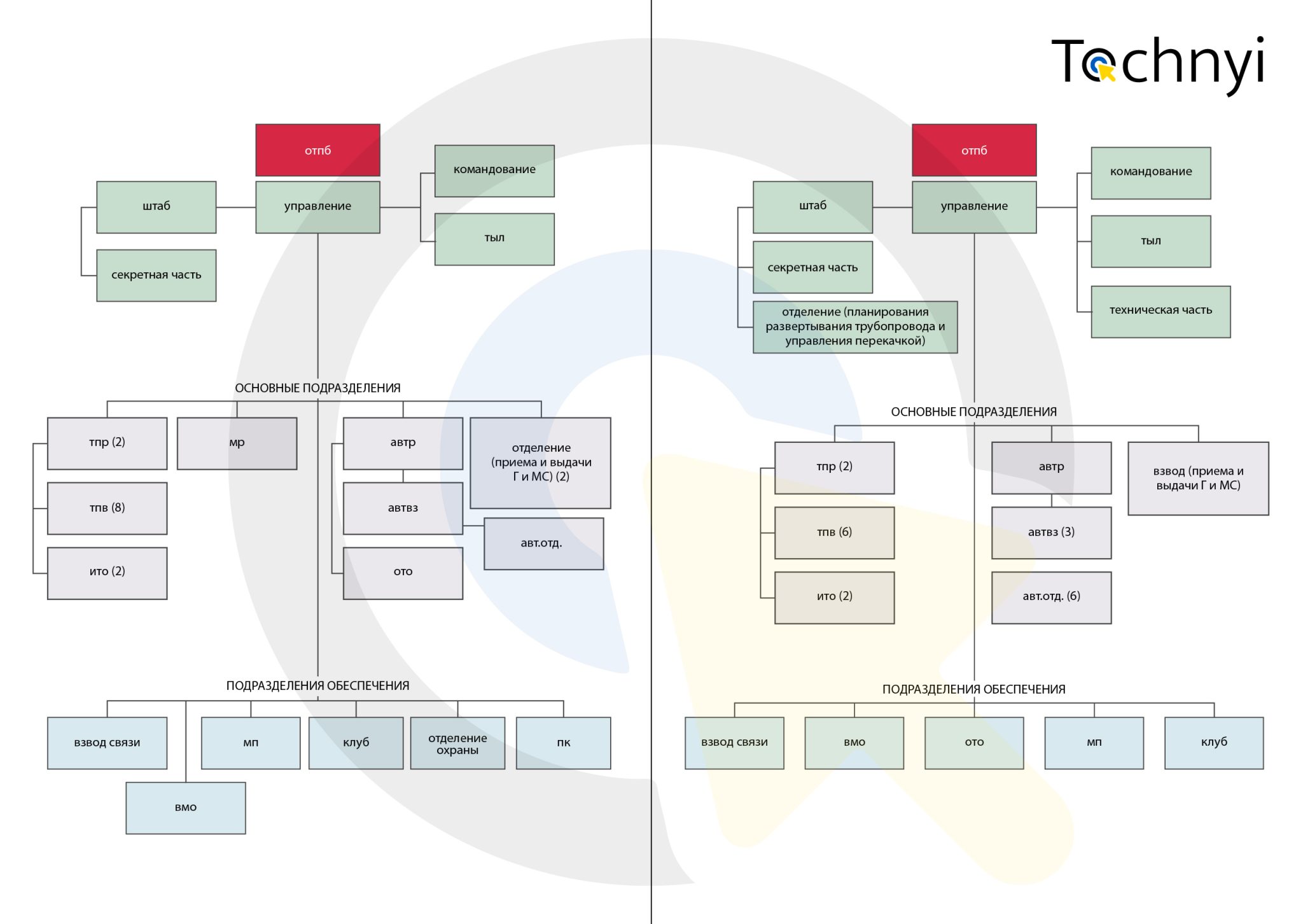The purpose of this article is to provide a brief overview of some of the major logistics units of the Russian armed forces that take a more direct part in military operations. This article is not designed to be an authoritative guide on this subject, for that a textbook would serve the reader better, however it is designed to act as a compendium to existing research.
The types of logistics units in the Russian army
Around 2010, during the last major reform of the Russian Armed Forces, its “Army Rear” was reorganized into an institution titled “Material and Technical Support of the Armed Forces.” “Material and technical support” loosely simplifies as “logistics” when translated into English. The logistics system of the Russian army broadly incorporates two types of units:
- Units responsible for the storage of military, technical, engineering and other equipment; fuel, food, water, clothing and other supplies related to the military. These units were covered briefly in the first article of the series.
- Units responsible for the transportation of equipment and supplies from one point to another, including to the frontlines.
This second group of units can further be divided into two subgroups:
- Units responsible for transportation by rail
- Units responsible for transportation by land (road, bridge, pipeline, etc)
While the railways are a vital part of the Russian military’s logistics network, a major part of the duties of the railway forces are closer to those of engineering forces and hence less than the typical functions expected of logistics units. In this article we will focus our attention on Russia’s system of military units responsible for transportation by land.
Logistics by land
Every frontline-deployable unit of the Russian army, larger than a company in size, has its own dedicated subunit responsible for supplies. Chart 1 below displays the general structure of a separate motor rifle brigade. Each armed battalion has a supply platoon (“взвод обеспечения”), and the brigade itself has a logistics battalion (“бмо” in the chart stands for “батальон материального обеспечения”) attached to it.

All division-sized units are supposed to have separate logistics battalions attached to them. Additionally, after the launch of Russia’s full-scale invasion of Ukraine, separate volunteer-based logistics battalions were established. However, these battalion-sized formations lack one or more of the full range of elements that make up a complete unit dedicated to logistics. For this reason, we will review more closely the separate logistics brigades instead.
General structure of a separate logistics brigade
A separate logistics brigade (SLB) under the Russian armed forces is a brigade-level unit, dedicated to logistics support functions. There are 12 known SLBs. Ten of these brigades are directly under the command of Combined Arms Armies (CAA), one SLB is under the command of the Black Sea Fleet (BSF), and one SLB is presumably under the direct command of the now-non-existent Western Military District (WMD). Four newer CAA have no known separate logistics brigades attached to them:
- The 8th CAA was formed in 2017. It is headquartered in Novocherkassk, and belongs to the Southern Military District (SMD).
- The 18th CAA was formed in the middle of 2023. It also belongs to the SMD.
- The 25th CAA was formed in late 2023. It belongs to the Eastern Military District (EMD).
- The 14th CAA is assumed to be the reformed 14th Army Corps of the Northern Fleet (NF).
The two CAA under the SMD might be sharing the separate logistics brigade originally meant for the BSF. However, it is more likely that each of these CAA has an as-of-yet unknown dedicated SLB.
We also suspect that an unknown SLB exists under the Baltic Fleet (BF). Most of the basic elements of such an SLB are stationed within the general zone of operation of the BF.
A better understanding of the specific service duties provided by these brigades can be acquired by examining their structure (see Chart 2).
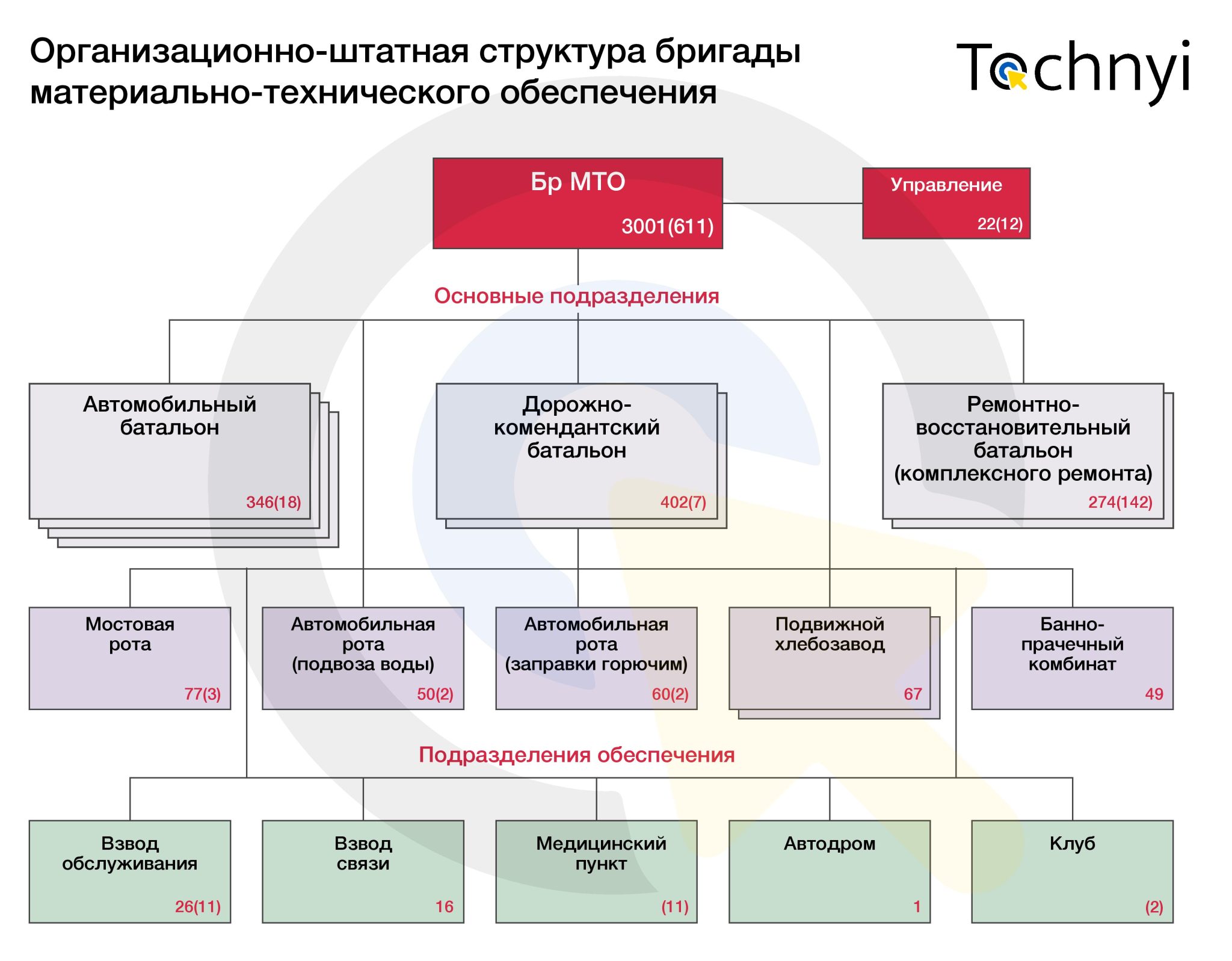
A logistics brigade consists of the following subunits:
- Headquarters
- Two (or three?) automobile battalions
- Pipeline battalion
- Road commandant battalion
- One or two repair and restoration battalions
- Bridge battalion/company
- Automobile battalion/company of multi-axle heavy wheeled tractors
- Refueling company
- Water supply company
- Field bakery
- Bath and laundry station
- Warehouses (ammunition, fuel)
- Service units (service platoon, communications platoon)
Not every SLB contains all of these elements. For instance, only 6 of the 12 brigades have known automobile battalions/companies of multi-axle heavy wheeled tractors. These units started forming in 2017, first under the Central Military District (CMD) and the EMD. They were likely battalion-sized units. Two more units of the same type were formed in 2018 under logistics brigades of the SMD and the WMD. These two units appear to have, at least originally, meant to have been company-sized. The main duties of these units appear to be related to repair and evacuation.
It is also likely that not all SLB have a pipeline battalion and not all of them have a bridge battalion. Some of the units may have only one repair and restoration battalion. The subunits belonging to each SLB that can be tracked from open sources are presented in Table 3 in the next section.
Known separate logistics brigades and subunits
After 2010, the Russian army’s supply and logistics system was almost completely overhauled. In some cases, the newly formed SLB were based on reformed logistics regiments (see Table 1).
| Separate Logistics Brigade | Military Unit | Based On |
| 51st | 72152 | Newly formed in 2010 |
| 69th | 11385 | 34th Logistics Regiment |
| 78th | 11384 | 32nd Logistics Regiment |
| 99th | 72153 | Newly formed in 2010 |
| 101st | 11388 | 47th Logistics Regiment |
| 102nd | 72155 | Newly formed in 2010 |
| 103rd | 72157 | Newly formed in 2010 |
| 104th | 11387 | 53rd Logistics Regiment |
| 105th | 11386 | 42nd Logistics Regiment |
| 106th | 72154 | Newly formed in 2010 |
| 133rd | 73998 | Newly formed in 2014 |
| 152nd | 80504 | Newly formed in 2018 |
The original 10 SLB were initially assigned consecutive unit numbers, depending on the basis on which they were formed (newly formed or based on an existing logistics regiment). The subunits were assigned subunit numbers, instead of separate military unit numbers, similar to the numbering system of the separate storage facilities. For instance, the subunits of 69th SLB (unit 11385) became 11385-1, 11385-2, 11385-3, and so on. There is some evidence that this numbering system was changed in 2016. For instance, the subunits of 69th SLB have been assigned the unit numbers between 98574 and 98583. Very little can be found in public sources about this new numbering system, but based on what is available we can estimate the range of new military unit numbers per SLB (see Table 2).
| Separate Logistics Brigade | New Military Subunit Number Range |
| 51st | 98567 to 98573 |
| 69th | 98574 to 98583 |
| 78th | 98584 to 98590 |
| 99th | 98591 to 98598 |
| 101st | 98648 to 98659 |
| 102nd | 98660 to 98668 |
| 103rd | 98670 to 98675 |
| 104th | 98602 to 98610 |
| 105th | 98630 to 98636, 98639 |
| 106th | 98640 to 98647 |
| 133rd | 98599 to 98600, 98626 to 98627, 98637 |
| 152nd | ? |
A good opportunity to get a glimpse of the real-life structure of an SLB is presented through a document, freely available online, containing information about the 78th SLB. The active duty units under this brigade appear to be the following:
- First automobile battalion (unit 98584)
- Second automobile battalion (unit 98585)
- Road commandant battalion (unit 98586)
- Repair and restoration battalion (unit 98587)
- Bridge battalion (unit 98588)
- Water supply company (unit 98589)
- Refueling company (unit 98590)
- A service platoon
- A communications platoon
- An artillery and rocket ammunition warehouse
- A fuel depot
All known SLB and their subunits can be found in Table 3 below. In the table, the pre-2010 military unit numbers are given for each subunit. In the cases where the post-2015 military unit number is known, it is provided together with the old number. The subunits are presented with their earlier unit names (for instance, 87th Automobile Battalion). However, these units are currently simply known as “Unit Type of Nth Separate Logistics Brigade” (for instance, 1st Automobile Battalion of 101st Separate Logistics Brigade).
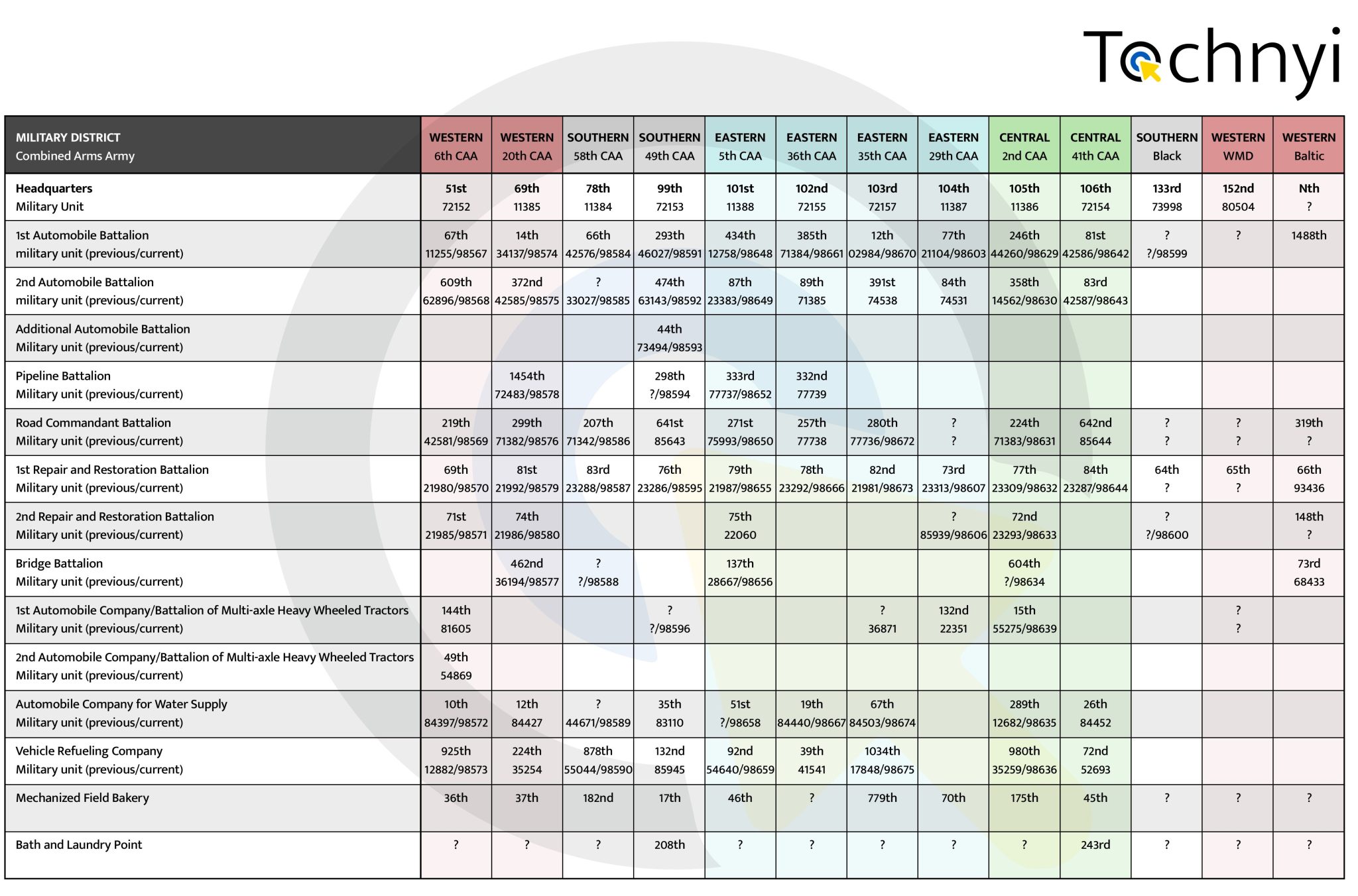
Deployment
Most of the available information on the deployment of specific military units comes from casualty-related reports, such as social media posts from relatives, as well as visual sightings of insignia on equipment or uniforms. Unlike units participating directly in combat actions, the logistics formations rarely show up in frontline reports. The only exceptions are repair and restoration battalions, which are deployed in more forward positions. The little amount of information we could track from public sources is presented in Table 4.
| Separate Logistics Brigade | Current Deployment | Prior Deployments |
| 51st | Stary Oskol/Gubkin, Belgorod Oblast | |
| 69th | Near Kharkiv Oblast | |
| 78th | Budennovsk, Stavropol Krai (HQ) | |
| 99th | Maykop, Adygea (HQ) | |
| 101st | Shyroke, Simferopol Raion, Crimea | |
| 102nd | Elements near Kursk city | |
| 103rd | 82nd Repair and Restoration Battalion near Izyum | |
| 104th | ||
| 105th | Rostov Oblast | |
| 106th | 84th Repair and Restoration Battalion is/was near Rubizhne, Luhansk Oblast | |
| 133rd | Krasnokamyanka, Feodosia Raion, Crimea (HQ) | |
| 152nd | Liski, Voronezh Oblast (HQ) |
In 2020, a thank you letter from the Russia-appointed head of Crimea was issued to several logistics units for their participation in the deployment of a main water supply line from the Taigan Water Intake to the Simferopol Reservoir. The units mentioned are included in Table 5 below.
| Separate Logistics Brigade | Unit Name | Unit Number |
| 69th | 299th Road Commandant Battalion | 98576 |
| 69th | 462nd Separate Bridge Battalion | 98577 |
| 69th | 1454th Separate Pipeline Battalion | 98578 |
| 99th | 298th Separate Pipeline Battalion | 98594 |
| 102nd | 332nd Separate Pipeline Battalion | ? |
| 133rd | Headquarters | 73998 |
Closing remarks
We have attempted to provide a broad overview of the major logistics units in the Russian army. As these units are stationed far behind the line of contact, information about them is scarce. This overview is based on open-sourced information and therefore it is both incomplete and likely to be incorrect in some places as a result. The reader is advised to exercise the appropriate level of caution when using this information.
The separate logistics brigades are the backbone of the logistics structure of the Russian ground forces. They are the key element carrying out the connection between the storage facilities in the rear and the frontline deployed armed formations. As the invasion has turned into a positional war of attrition, understanding the structure and functions of these units is essential for understanding the direction of the military operations as a whole.
Addendum: Structure of some specialized logistics battalions under separate logistics brigades
- Automobile battalion
Consists of:
- Two (or more) automobile companies
- Refueling company
- Communications platoon
- Automobile repair platoon
- Logistics platoon
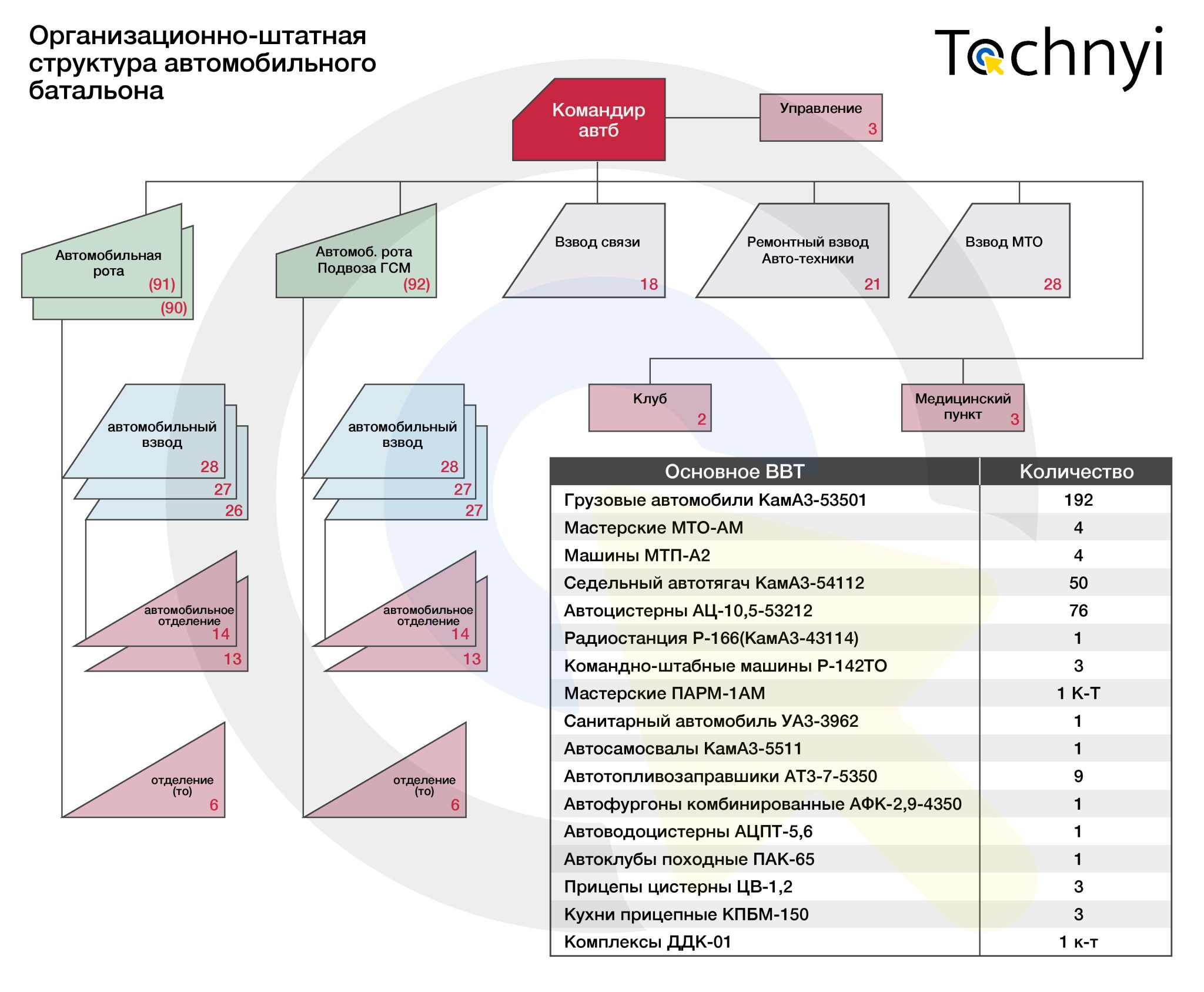
- Repair and restoration battalion
Consists of:
- Repair company (armored vehicles)
- Repair company (automobiles)
- Repair company (weaponry)
- Repair company (specialized equipment)
- Repair company (evacuation and storage)
- Logistics platoon
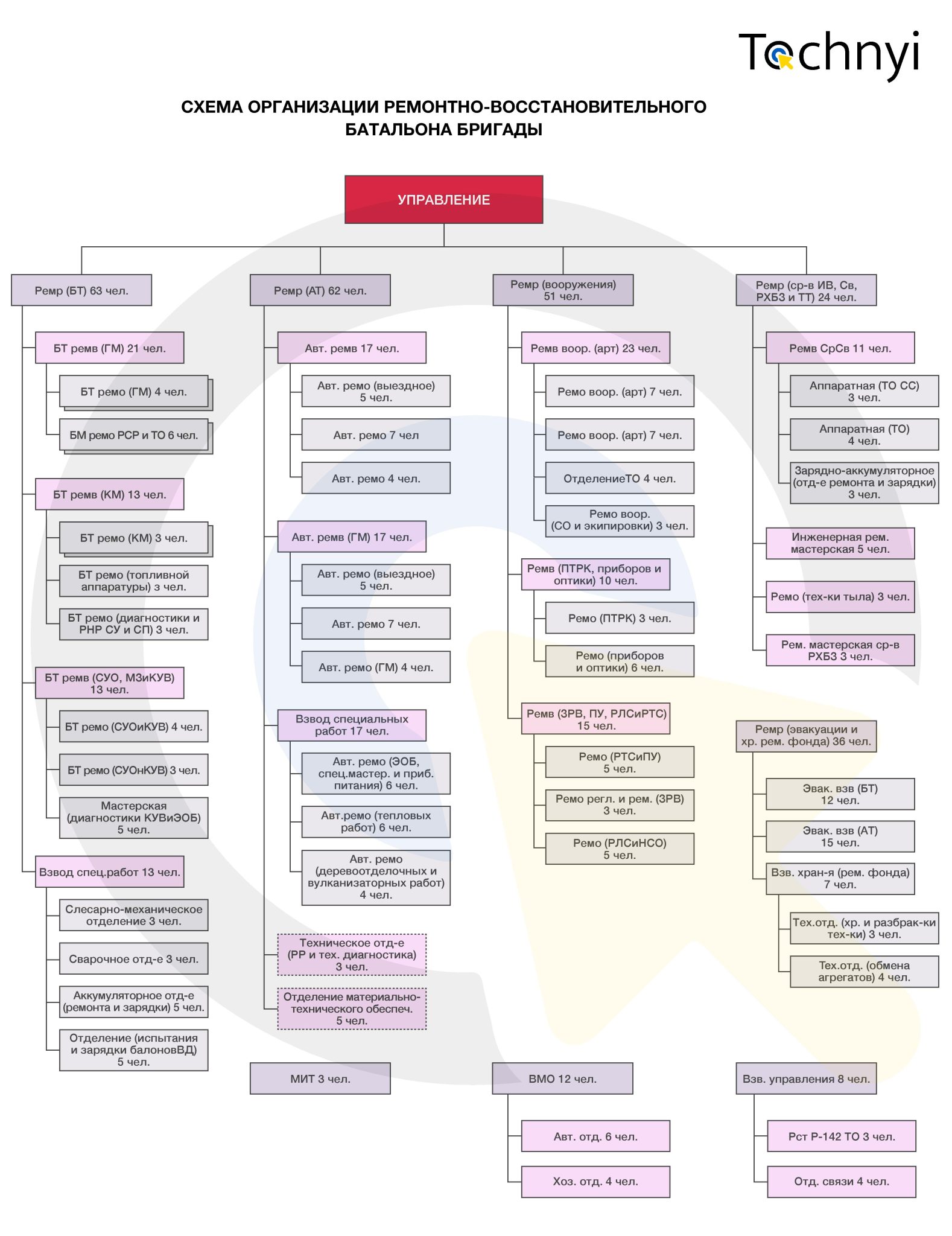
- Pipeline battalion
The chart demonstrates two different structures of a pipeline battalion, where the newer structure allows for faster pipeline installation:
- To the left: 2015-2019 period, key unit in the structure is the pipeline company
- To the right: 2020 and later, key unit in the structure is the pipeline platoon
The current structure consists of:
- Two pipeline companies with six pipeline platoons
- One Automobile company with three automobile platoons
- Reception and issuance platoon
- Communications platoon
- Logistics platoon
